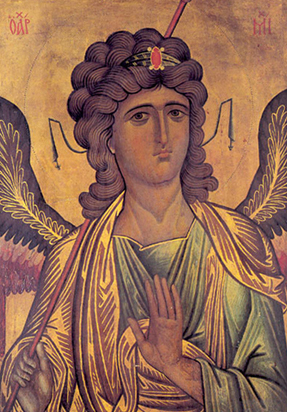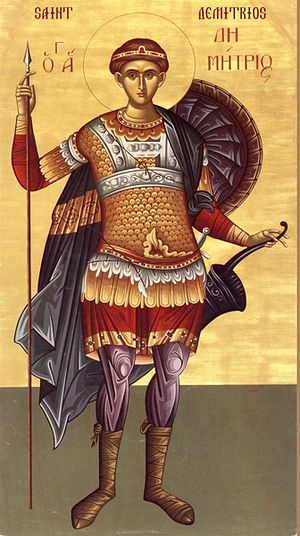Science
On Names and Angels. The Day of Archangel Michael
23. November 2015 - 10:51 “There is no one like God”—in this is expressed all of the great Archangel’s knowledge of his God. He doesn’t describe Him, nor does he explain—he stands and witnesses. In this is his inclusion in the radiance of the Divinity, and in this is the measure by which he manifests this radiance and opens for us the way to the Lord’s mystery by his word, and by those names that express all his unfathomable experience of the unfathomable God.
“There is no one like God”—in this is expressed all of the great Archangel’s knowledge of his God. He doesn’t describe Him, nor does he explain—he stands and witnesses. In this is his inclusion in the radiance of the Divinity, and in this is the measure by which he manifests this radiance and opens for us the way to the Lord’s mystery by his word, and by those names that express all his unfathomable experience of the unfathomable God.
There is a place in the book of Revelations where the seer of mysteries, St. John, tells us that when the time comes and we will all be in the Kingdom of God, then each will receive a mystical name by which only God Who gives it knows and recognizes the one who receives it. This name as if contains in itself the whole mystery of the person; by this name is everything said about him; no one can know this name other than God and the one who receives it, because it determines the unique, inimitable relationship that exists between God and His creature—each and every one, and for Him one and only.
Weekly Diocesan Bulletin - Sunday, November 22, 2015
20. November 2015 - 10:4925TH SUNDAY AFTER PENTECOST:
THE HOLY MARTYRS ONESIPHORUS AND PORPHYRIUS; SAINT NECTARIOS, METROPOLITAN OF PENTAPOLIS
RESURRECTIONAL TROPARION - TONE EIGHT: Thou didst descend from on high, O Merciful One! Thou didst accept the three day burial to free us from our sufferings! O Lord, our Life and Resurrection: Glory to Thee!
The Apophatic Quality of Speaking About God
17. November 2015 - 13:30 It is always a good thing, surely, to examine the meanings of the words we speak, but when we speak about God critical reflection is downright imperative.
It is always a good thing, surely, to examine the meanings of the words we speak, but when we speak about God critical reflection is downright imperative.
Take, for instance, the adjectives “eternal” and “infinite,” which for many centuries have been used as descriptive of God. If we spend a minute or so examining these modifiers, it should be obvious that they are not, in our usual sense, descriptive. To declare that God is infinite is not something on the order of saying the soup is hot. Nor is ascribing eternity to God like attributing roundness to a pipe.
Weekly Diocesan Bulletin - Sunday, November 15, 2015
15. November 2015 - 10:39 24TH SUNDAY AFTER PENTECOST: THE HOLY MARTYRS ACINDYNUS, PEGASIUS, AND COMPANIONS
24TH SUNDAY AFTER PENTECOST: THE HOLY MARTYRS ACINDYNUS, PEGASIUS, AND COMPANIONS
RESURRECTIONAL TROPARION - TONE SEVEN: By Thy Cross, Thou didst destroy death! To the thief, Thou didst open Paradise! For the myrrh-bearers, Thou didst change weeping into joy! And Thou didst command Thy disciples, O Christ God, to proclaim that Thou art risen, granting the world great mercy!
The Commemoration of the Great Earthquake at Constantinople and St. Demetrius
8. November 2015 - 12:43 One may well wonder why we are commemorating this particular earthquake. After all, there have been many earthquakes, as well as other natural disasters in human history – so why commemorate this one?
One may well wonder why we are commemorating this particular earthquake. After all, there have been many earthquakes, as well as other natural disasters in human history – so why commemorate this one?
This earthquake in Constantinople took place in 740 AD. This was at the time Emperor Leo was destroying icons and the people of Constantinople felt that it was God’s anger that led to this disaster. The believers prayed to St. Demetrius of Thessalonica and the earthquakes ceased.
St. Demetrius of Thessalonica is a third to 4th century martyr. He was born in 270 AD in Thessalonica. He came from a noble Roman background and according to some traditions he was a soldier, and is depicted as a solder on his icons. He was martyred in approximately 306 AD during the persecution of the Roman Emperors Diocletian and Galerias. During the reign of the Emperor St. Constantine (306-337) his relics were exhumed and it was found that the relics streamed myrrh, a miraculous sign which pointed to St. Demetrius being a saint, and a church was built for these remains in Thessalonica and they remain there today. Emperors sometimes tried to bring the relics to Constantinople, but the saint always revealed that his relics should stay where they were. For centuries, the people of Thessalonica prayed to St. Demetrius to save them from natural disasters and enemy attack.
Weekly Diocesan Bulletin - Sunday, November 8, 2015
8. November 2015 - 10:24 23rd Sunday after Pentecost: Holy & Glorious Great-martyr Demetrius the Myrrh-gusher of Thessalonica; Commemoration of the Great Earthquake
23rd Sunday after Pentecost: Holy & Glorious Great-martyr Demetrius the Myrrh-gusher of Thessalonica; Commemoration of the Great Earthquake
in Constantinople in 740
RESURRECTIONAL TROPARION - TONE SIX:
The angelic powers were at Thy tomb; and the guards became as dead men; and Mary stood by Thy grave, seeking Thy most pure Body. Thou didst capture hell, not being tempted by it. Thou didst come to the Virgin, granting life. O Lord who didst rise from the dead: Glory to You!

